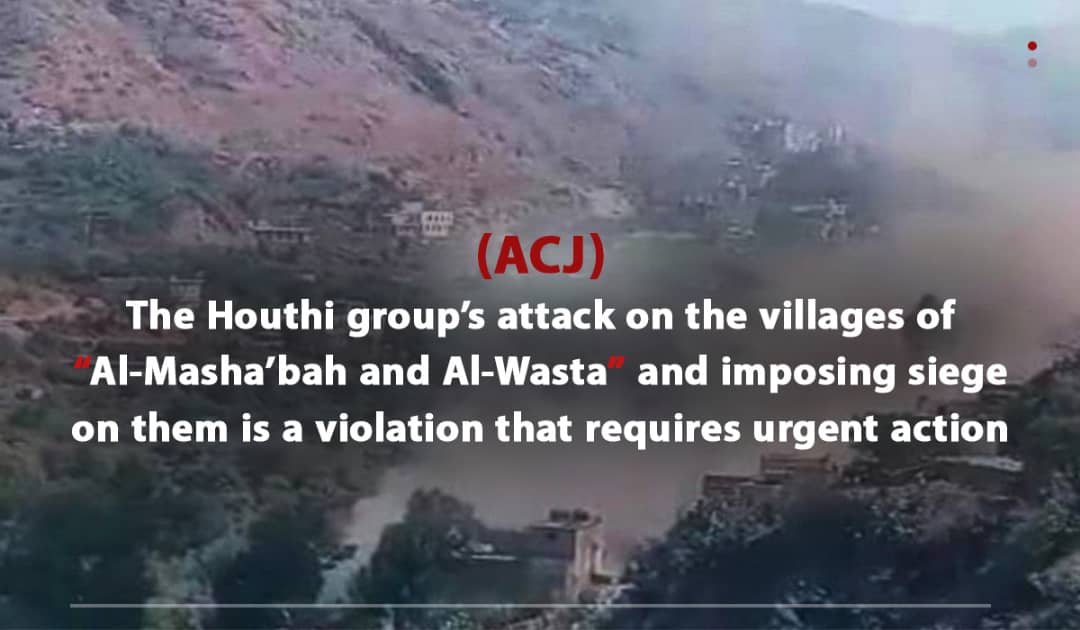

Michigan - The American Center for Justice (ACJ) said that the Houthi group’s policy of retaliation against individuals by blowing up their homes and directly targeting them was a full-fledged crime that requires holding the perpetrators accountable. The center expressed its concern about the continuation of the attack and siege imposed by the Houthi group against the people of the villages of Al-Masha’bah and Al-Wasta in Ibb Governorate for the sixth day in a row.
In a statement issued today, Sunday, the ACJ indicated that the Houthi group stormed the villages of Al-Masha’bah and Al-Wasta six days ago, raiding citizens’ homes, kidnapping dozens of civilians, including women, and imposing a siege on the two villages and cutting off their drinking water.
The Houthi group abducted 60 citizens, including 5 women from the Al-Tawil family, cut off the water project for the people, and continues to impose a strict siege for the sixth day in a row by deploying dozens of military vehicles and individuals. Some pictures obtained by the American Center for Justice showed that several houses were on fire due to bombings carried out by Houthi elements against the residents of Al-Qaryatayn, including the home of the “Al-Tawil” family in Al-Masha’bah, Al-Mashna District, on the Maitam Road, southwest of Ibb city, as members of the group directly blew it up, killing 2 civilians from the Al-Tawil family, “Saddam Al-Tawil” and his brother, while their mother and sister were injured as a result of the gunfire.
In this context, the ACJ points out that the Houthi group has been blowing up the homes of individuals in the areas it raids, especially its political opponents for years. The Houthi group deliberately causes severe harm to the most important component of life, housing, in order to terrorize civilians.
The Center noted that these practices were documented during its report, which it launched at the end of 2023, entitled “Tears on Rubble." The report reviewed the ugliness of the crime of blowing up houses and its danger to the societal and security fabric in Yemen. The report, which is considered one of the most prominent reports that shed light on the issue of house bombings, revealed violations by the parties to the conflict, especially the Houthi group, in blowing up houses, displacing their residents, and killing many of their residents.
House bombing violations caused deaths and injuries to civilians, whether homeowners or neighbors. The ACJ documented 27 civilian casualties, including 11 children and 5 women who died under the rubble of their bombed homes, while 24 victims were wounded, including 9 children and 7 women. The report ranked the governorates according to the highest percentage in terms of the number of bombed houses. Al-Bayda Governorate was the highest with 118 houses, followed by Taiz with 110 houses, then Al-Jawf with 76 houses, Saada 73 houses, Ibb 62 houses, Sanaa 57 houses, Ma'rib 53 houses, Dhamar 37 houses, Hajjah 31 houses, Al-Dhalea 23 houses, Lahj 22 houses, Amran 21 houses, Al-Hudaydah 14 houses, Shabwa 10 houses, Abyan 5 houses, Aden 1 house.
It was also proven to the American Center for Justice that 89% of the victims of house bombings were subjected to forcible displacement from their original homeland to various places. 65% of them sought refuge in displacement camps in the governorates of Ma’rib, Taiz, Al-Dhalea, and Hajjah, or to abandoned homes.
ACJ notes that the information it monitors and the information it receives proves beyond a reasonable doubt that the Houthi group has committed serious violations and crimes that violate the rules of international law. These crimes also threaten the lives of individuals, kill civilians, especially women, cause arbitrarily arrest, and attack and blow up homes. The Center indicated that these practices constitute war crimes and crimes against humanity in accordance with the Rome Statute, which formed the International Criminal Court.
It also calls on the international community to exercise an effective and greater role than its current role and work to stop violations against civilians, noting that the negative role of UN bodies has given armed groups in Yemen the green light to continue violating the rules of international humanitarian law and human rights laws without any fear of criminal prosecution.